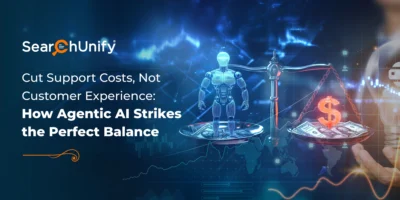
In the rapidly evolving AI landscape, new technologies and concepts are continually reshaping the possibilities of what AI can achieve. While many are still grappling with generative AI (GenAI) capabilities, a new frontier has emerged, captivating the minds of tech leaders and innovators: agentic AI.
This next-generation AI system promises to transform industries by automating workflows, autonomously making decisions, and even anticipating customers’ needs. But why exactly is agentic AI garnering such intense interest from tech leaders?
Let’s explore how this emerging technology is set to revolutionize enterprise operations and redefine the role of AI in business strategy.
What is Agentic AI?
Agentic AI goes beyond traditional models by autonomously achieving goals without constant oversight. Unlike GenAI, which focuses on content creation, agentic AI understands objectives, plans actions, adapts to changing conditions, and learns from its experiences.
For instance, during a product launch, an AI agent could prioritize tickets, route them to teams, assist agents with real-time insights, and resolve routine issues. Afterward, it would analyze customer feedback to improve future processes, all autonomously.
In essence, agentic AI combines autonomy with advanced reasoning, creating a more adaptive, capable, and innovative class of AI.
Why is Agentic AI Capturing the Attention of Tech Leaders?
Here are some reasons which explain why agentic AI on every tech leader’s radar:

Real-Time Adaptability
In fast-paced industries like customer support, finance, supply chain management, and cybersecurity, agentic AI’s ability to adjust strategies in real-time makes it ideal for sectors requiring quick decision-making. This ensures businesses remain resilient and adaptable to changing conditions.
Unmatched Autonomy and Efficiency
Agentic AI stands out for its autonomy, handling tasks without constant oversight. This independence allows it to manage complex workflows and respond to challenges in real-time, freeing human resources to focus on strategic initiatives and reducing operational bottlenecks—an invaluable advantage for tech leaders seeking efficiency.
Imagine an organization is receiving high-volume support tickets, including complex one that often require support agents to consult multiple team members. This overwhelms agents, causing delays in the first response and extending resolution times, ultimately leading to customer dissatisfaction.
Here comes agentic AI, which automates all these tasks by analyzing incoming tickets, categorizes them based on the issue, and provides immediate first responses considering previous interaction, or customer history. It rescues agents from burnout and enhances the customer experience.
Enhanced Problem-Solving
Agentic AI combines machine learning with goal-oriented behavior to solve complex problems. It analyzes data, identifies patterns, and makes decisions that optimize outcomes. Beyond automating routine tasks, it provides innovative solutions in dynamic business environments.
Scalability Across Industries
Once trained, agentic AI systems can be scaled across multiple industries, from automating customer service in retail to managing compliance in regulated industries and optimizing global logistics. This scalability makes it a game-changer for operations.
Transforming Customer Experience (CX)
Customer experience (CX) is another area where agentic AI is making waves. With the ability to interact autonomously with customers, these agents can provide personalized, real-time responses, improving engagement while reducing human labor costs.
By learning from each interaction, agentic AI can further enhance customer journeys, offering businesses a smarter, scalable way to boost satisfaction.
Challenges and Ethical Considerations
While the benefits of agentic AI are clear, tech leaders must address critical challenges and ethical considerations. These include:
Ethical Decision-Making
As agentic AI systems make autonomous decisions, ensuring that these decisions align with ethical standards and with human values is paramount. AI’s “black box” nature makes it challenging to understand how decisions are made, which could lead to accountability issues.
For instance, an e-commerce platform uses agentic AI to personalize product recommendations for its customers. It analyzes customer purchase history, browsing behavior, and demographic data to suggest relevant products. However, the AI’s decision-making process is not fully transparent, making it challenging to understand how certain recommendations are generated.
Data Privacy and Security
With greater autonomy comes the need for stronger safeguards. Tech leaders must ensure that agentic AI systems handle sensitive information securely, mitigating the risk of data breaches or misuse.
Impact on the Workforce
While agentic AI promises greater efficiency, it may also displace certain job roles. C-suite executives will need to plan for reskilling initiatives and a strategic shift in workforce roles to harness AI’s full potential without causing significant disruption.
The Road Ahead: A Balanced Approach
As agentic AI continues to evolve, its potential to revolutionize industries and transform business models is becoming increasingly evident. However, realizing this potential demands a balanced approach.
Autonomy must be coupled with insightful human oversight, ensuring that AI systems not only drive efficiency but also make ethical and responsible decisions.
Tech leaders can strategically integrate agentic AI into their operations to unlock unprecedented opportunities for innovation, scalability, and strategic growth. This journey toward agentic AI is just the beginning; those who seize this opportunity will not only adapt but excel in an ever-evolving marketplace.













